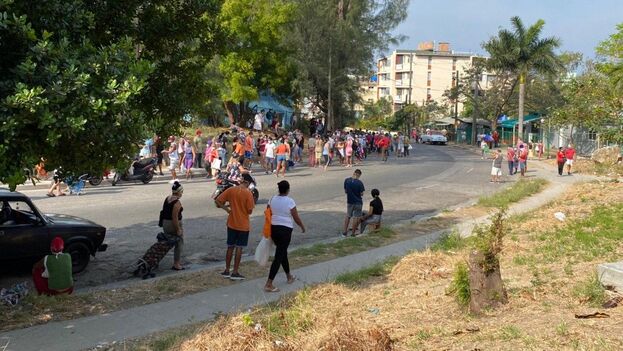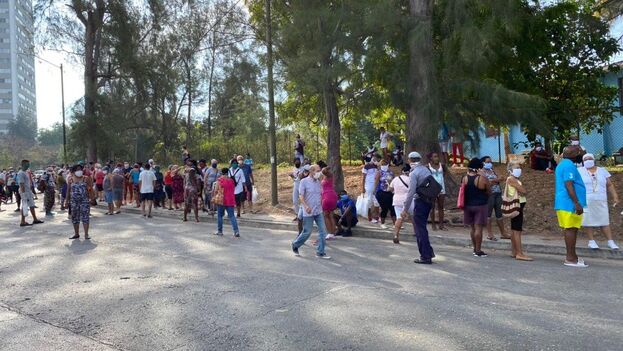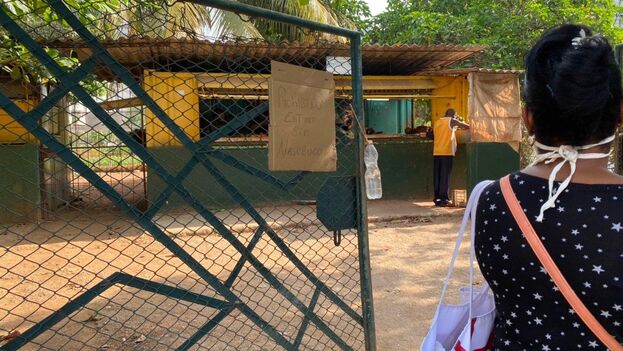
![]() 14ymedio, Luz Escobar, Havana, 11 April 2020 — “I’m not leaving here until I buy something,” said a woman in a categorical tone outside a Havana store. The official announcement that as of Saturday commercial centers would be closed and public transport cancelled unleashed an avalanche of buyers trying to get food ahead of time, in the midst of a Good Friday marked more by anxiety than spiritual retreat.
14ymedio, Luz Escobar, Havana, 11 April 2020 — “I’m not leaving here until I buy something,” said a woman in a categorical tone outside a Havana store. The official announcement that as of Saturday commercial centers would be closed and public transport cancelled unleashed an avalanche of buyers trying to get food ahead of time, in the midst of a Good Friday marked more by anxiety than spiritual retreat.
“It doesn’t matter if it is ground meat, hamburger or chicken, but I have to get out of here with something in my hands, because in my house there is nothing to eat,” the lady repeated when uncertainty ran through the line. “No, no one knows, they have not yet opened and nobody knows what is inside,” one man explained to the curious who were passing by asking what products were for sale at this store in El Cerro.
The confusion marked a whole day that, since 2014, has been a holiday in Cuba; after the visit of Pope Pope Benedict XVI to the Island, the authorities decreed Good Friday a holiday. The tradition of spending the day with family has been recovering little by little after decades of strict atheism, but given the advance of the coronavirus, people have preferred to seek basic products.
The unease, the crowds and even the fights were not exclusive to the most populated neighborhoods of the Cuban capital. Even in the quiet of Nuevo Vedado, in the Plaza of the Revolution municipality, a line stretched out in front of each store, a scene that is not unusual on the Island but that, in recent weeks, has become even more common.
Faced with the call of the authorities to maintain discipline in the ranks, avoid physical contact and not fall into alarmism, the response of many Cubans has been to demand a better supply in the network of state stores, so that the shortages won’t trigger anxiety and an “each man for himself” atmosphere. But the national economy is far from being able to satisfy that demand.

In a curve of Tulipán street, next to 26th avenue, a tumult was set off this Friday while a policeman tried ineffectually to keep a distance of one and a half meters between customers. “This is not going to be the same relaxed approach as yesterday; they have to separate even if the line streteches to Boyeros,” said the officer, pointing to the next avenue more than 300 meters from the site.
“We are going to stand in line but they have to stock the shelves,” shouted a man in a blue sports cap with “Cuba” printed on it, responding to the police. “We can get to a meter and a half, wear the facemasks, not scream, not riot, but what is the use if when we manage to get inside there is nothing,” he added. “People are like this because they don’t know what they are going to eat tomorrow.”
“Right now you cannot make purchases to last for a month because in the stores everything is rationed to two products per person. They tell us to stay home but every three days you have to take the street,” Eduardo Antonio told 14ymedio, after having arrived to stand in line at six in the morning.
“The stores are bare, this line here is to buy chicken but it has not yet arrived. The clerk says that they are waiting for the truck that supplies it, but itcould come at noon or at three in the afternoon,” added the man, speaking at half past nine in the morning. Everyone in the long line has a piece of cloth on their faces, but few keep their distance.
A market employee explained to this newspaper that they were only planning to open to the public once the chicken arrived. “Today, only meat will be sold,” he warned anxious buyers, a decision that generated widespread discomfort for customers, especially those who were looking for canned preserves, pasta or cereals.
“I just want to buy vinegar and mayonnaise, why won’t they sell me what I need when I’ve been in this line for hours,” one woman demanded. The employee just managed to shrug. “Right now, when the chicken arrives, they could sell the other products they have there, but no, here we are always going to extremes, it is not easy,” said the customers.

A few meters from the store, an agricultural market sold tomatoes, onions, chili peppers, mangoes, beans, and bananas. With a line of only eight people, the place has closed its platform for selling meat products more than a week ago because the cost of a pound of pork has exploded with the pandemic and the imposition of prices caps a year ago prevents producers from selling their merchandise at higher rates.
“They will never see me in that line for the chicken,” says a young woman who waits to get some vegetables. “I prefer to eat rice with vegetables and a plate of beans rather than waste five hours of my life in one of those lines and get sick.” Before entering the store, each buyer must wash their hands with a mixture of water and chlorine.
A few meters away, there is another long line in front of a small store. In the midst of the noise, a scream is heard. “Get out of the way, a foreigner is going to leave, I don’t know how that man got in here,” repeats an employee, while in line there are those who roll their eyes and some run away*. An opportunity that others take advantage of to enter the market, where in the fridges there is only turkey hash from Canada.
*Translator’s note: Foreigners are particularly suspect as possible carriers of Covid-19, as the first known case in Cuba was a tourist.
_______________
COLLABORATE WITH OUR WORK: The 14ymedio team is committed to practicing serious journalism that reflects Cuba’s reality in all its depth. Thank you for joining us on this long journey. We invite you to continue supporting us by becoming a member of 14ymedio now. Together we can continue transforming journalism in Cuba.
